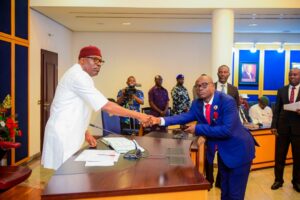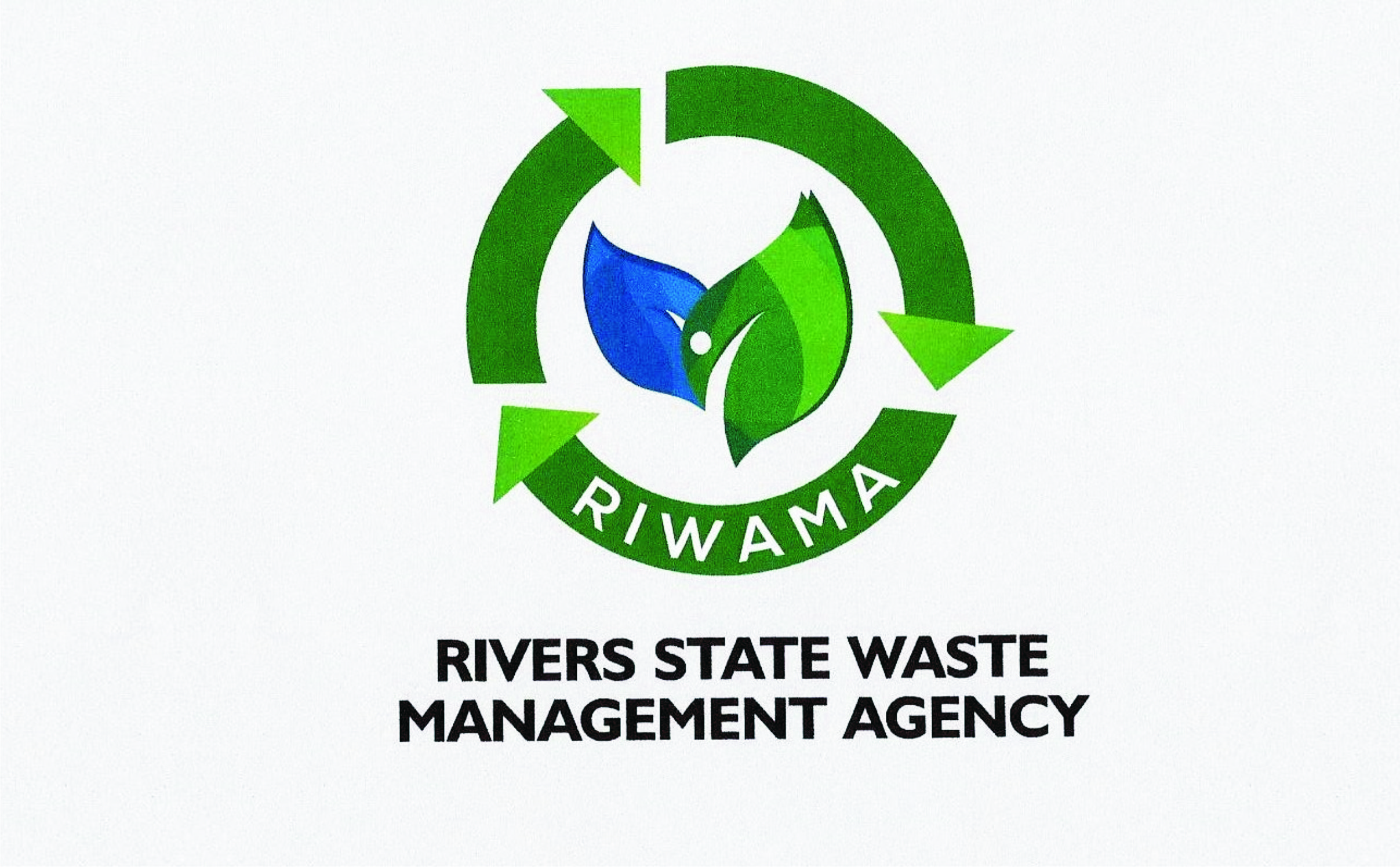News
Local Govt Elections As A Referendum
The much-awaited local government elections in Rivers State would become a reality, by the Grace of God on the 5th of October, 2024. From all indications, the Rivers State Independent Electoral Commission would fulfil one of the landmark political directives of Governor Siminalayi Fubara on that date.
In the midst of unexpected distractions and challenges from the direction of the immediate past Governor of the state, Ezebunwo Nyesom Wike, it became absolutely necessary that Fubara must visibly assume control of the structures of government and governance which the former Governor had claimed to be under his control and even dared that they should not be tampered with.
That was inspite of the fact that Local Governments constitute a tier of government as contained in the Nigerian Constitution, just as other tiers of government like the Federal and State Governments.
Indeed, the Nyerishi Mbam as Wike is being currently addressed by his supporters surprisingly claimed that those whom he claimed to have fixed as Chairmen and Councillors of the 23 local government areas were members of his political structure and should remain untouched even after the end of his tenure.
To affirm that ridiculous claim, another arm of Wike’s superficial structures, the defected House of Assembly members, also purportedly enacted a law to extend the tenure of the chairmen and Councillors for a period of six months
That seemed to have broken the patience and tolerance of Governor Similayi Fubara to call off the bluff of Nyesom Wike and put the issue of the Local Governments on its proper perspective.
Secondly, it became absolutely necessary to conduct local government elections after the Supreme Court’s decision for the direct funding of all Local Governments in the country.
The apex court had clearly directed that only democratically elected Local Governments would be entitled to the allocations.
That was basically the reason to justify the holding of the elections which are also being held in other States around the country.
The supporters of the former Governor failed to make any justifiable case against the appointment of Care Taker Committees in the respective Local Government Areas to manage the affairs of that tier of government and avoid a vacuum while awaiting the election of substantive office holders.
Most previous administrations in the State had carried out similar exercises when the need arises including. the Wike administration.
It would be recalled that when the initial preparations for the Local Government elections were announced, the two parties of” a leprous hand”, as the Late Senior Advocate, Bola Ige would say, the Peoples Democratic Party and the All Progressive Congress in the State announced their intention not to participate in the elections.
The reason for that decision was not farfetched because the two parties were and being controlled by the former Governor, Nyesom Wike.
Chukwuemeka Aaron, the Chairman of Wike’s arm of the Peoples Democratic Party in the state repeated the party’s stand not to contest the elections.
However, the boycott of the elections by the Tony Okocha faction of the APC does not diminish the wide acceptance of the forthcoming elections. About 20 registered parties are falling over themselves on their decision to participate in the elections.
The elections would produce 23 Local Government Council Chairmen and almost 400 councillors.
Already, the State is agog with campaigns by the candidates and their respective parties, going round all the nooks and crannies of all the wards in the local governments.
Pundits are already predicting that voters would be more excited to participate in an election that is being touted as the most credible than previous and similar exercises ever held in the State.
Indeed, Tony Okocha, the most vitriolic critic of Governor Siminalayi Fubara had openly stated in a news interview that during their time, when he was the Chief of Staff in one of the previous administrations, they were writing the results or outcome of the elections in the (his) office rather than allowing the appropriate body, the Electoral Commission to do its job.
Contrary to that infamous practice, the Fubara administration had declared not to be involved in the electoral process.
The Rivers State Independent Electoral Commission, has indicated that it is on ground and it is adequately prepared for the elections.
The Rivers State citizenry is massively informed and educated on the need to turn-out in their thousand to vote for their candidates in all the wards and local governments of the States.
The parties and their candidates are demonstrating a positive sense of democracy which was so much lacking during the last Presidential and Legislative elections.
In view of the wide public acceptance of the elections, the Rivers State Independent Electoral Commission is being expected to produce a free, fair and transparent election.
Political pundits are pointing out an interesting scenario, arguing that the positive approval given to the holding of the elections is clearly transmuting to a referendum to finally nail the political reality on ground that a greater majority of people in Rivers State are solidly behind Governor Siminalayi Fubara in his policies, programmes and projects.
Those in this school of thought believe that despite the distractions, intimidations and blackmails from his political opponents, Sim is steadfastly carrying out his projects and programmes unperturbed.
Their argument is that the elections should equally rate as a referendum of approval for SIM.
The massive enlightenment programmes of the various Simplified movement are yielding positive results and political consciousness in the Rivers political space,
The Simplified Movement is present in all the Local Government Areas of the State. There is also the senior citizens’ version that is called the Supreme Council for Sim.
Indeed, there are numerous support groups for SIM, to the extent that it is being openly advertised that the Governor’s entry to politics has agitated and uprooted a political culture that was enmeshed in docility and disinterest in politics and its negative colorations we had witnessed in the past.
That is the reason why the elections could be tagged as a referendum of sorts.
Amabipi Martins
Elder Martins is former General Manager of Rivers State Newspaper Corporation resides in Port Harcourt.
News
Enforce Discipline In Legislative Service, Fubara Charges New RSHA Commission

Rivers State Governor, Sir Siminalayi Fubara, has charged newly sworn-in chairman and members of the State House of Assembly Service Commission to achieve greater productivity, promote highest standard and insist on best practices in the discharge of Legislative services.
Governor Fubara also urged them to ensure that parliamentary staff are put through disciplinary conducts in the discharge of their duties in the service.
Governor Fubara gave the charge shortly after the chairman and members of the Rivers State House of Assembly (RSHA) Service Commission were sworn-in at the Executive Chamber of Government House in Port Harcourt, last Friday.
The Governor also sworn-in the chairman and members of the Rivers State Local Government Service Commission.
Hon Tamunosisi Gogo-Jaja, is the chairman of RSHA, with Dr Kennedy Ebeku, Hon. Soberekon Clark, Hon. Jones Ogbonda, and Hon Kingston Sylvanus as members.

For the Rivers State Local Government Service Commission, Hon GoodLife Ben will serve as the chairman, with Chief Emmanuel G. Jaja, Ms. Betty Warmate, Barrister Jerome Chimenem, Hon Prince O. Ohochukwu, Barrister Philip Okparaji, and Christian Amadi as members.
Governor Fubara explained that the constitution and swearing-in of the respective commissions were delayed with the hope that all former members of the political block will come back together but quickly added that such expectation is dashed now as governance has to move on.
He said: “As it stands now, our position is very clear. The ship that we are onboard is clear, and the activities of governance have to continue.
“So, this swearing-in is to give these two units of government – particularly, the House of Assembly Service Commission, a formal commission so that you can start carrying out the activities of promotion, discipline and every other thing that has to do with the legislative staff activity.”
Governor Fubara emphasised: “This assignment is not business as usual. You have to take full charge, and you have to ensure that there is discipline in the service.”
Speaking on the Local Government Service Commission, Governor Fubara said an acting Chairman was previously appointed to hold brief while the situation was being studied but quickly added that as it stands now, a full fledged commission has to be constituted to steer affairs.
Governor Fubara stated that the various Local Government Councils have been mandated to commence payment of the N85,000.00 Minimum Wage to their workers.
However, Governor Fubara said that mandate had met with series of complaints about ghost workers or inflated payroll staff list, which required proper scrutiny in order to ensure that only genuine workers benefit.
He said, “You must ensure that you support the Local Government Chairmen to get rid of those fake names in the payroll, so that when they implement the N85,000.00 Minimum Wage, it will not be too much burden on them.
“I am not saying you should go and dismiss people who are genuinely employed. Hear me very well: there must be proper scrutiny to be sure that whoever is there must be a genuine civil servant employed by the commission, and must have met all the conditions.”
Governor Fubara also directed the commission to address the issue of staff stagnation on a particular grade level, which is an ugly practice, and make sure those due promotion truly benefit from statutory progression in the service.
He said, “The second side is, you have the issue of promotion, you must also ensure that they are adequately promoted so that they can start enjoying like their counterparts in the mainstream.
“There is too much dragging of their promotion, for somebody to be on Grade Level 4 for over 30 years is not good. It is not good news.”
Governor Fubara maintained: “I believe strongly that you will not allow yourselves to be corrupted like those stories that we used to hear. Make sure that there is acceptable level of discipline and standard in the Local Government Service Commission.
“I also believe strongly that you are already prepared for this assignment, and since you are prepared, I will charge you to go do what you know how to do best. Be assured that the government will give you all the necessary support.”
Governor Fubara noted that the task before them could seem Herculean but they should be assured of support from his administration to drive the assignment given to them to reckonable success.
News
Be Innovative In Waste Management, Fubara Tasks RIWAMA ….. Inaugurates Six-Member Board

Rivers State Governor, Sir Siminalayi Fubara, has said that the open dumping of wastes has to be replaced with a more innovative and efficient disposal method so that wastes can be taken off the streets and turned into income-yielding ventures.
Governor Fubara made the assertion while giving charge to the newly constituted Board of Directors of the Rivers State Waste Management Agency (RIWAMA) and its Managing Director at Government House in Port Harcourt, last Friday.
The Board members included Engr. Edward Namiesimagh as the chairman, while Hon. Bishop Best, Dr. Ipalibo Sogules, Richard Mazi, and Civian Y. Nwibari are members, with Hon. Orukwem Amadi-Oparaeli as the Managing Director.
Governor Fubara said waste disposal and management have remained a major global concern, adding that over the years, successive administrations in the State had struggled to take wastes off the streets but ended up taking them to other dumpsites where they constitute nuisance and environmental hazards.
He said, “Today, I am here putting a team together to look at these challenges differently. Let it not be the regular pattern whereby at the end of the month, you come to collect money from me for payments.
“Don’t indulge in appointing your friends as sweepers, evaluators of debris, then you start building hotels, or buying big cars. Let us go beyond that and tap into the potentials of waste management.
“It is an area in this world that there is so much money in. It is an area that creates employment, and generates huge revenue. It is not just depending on what I will give to you. Consider what change you’ll bring to the work, that’s what I want to see in Rivers State.”
Governor Fubara told them that they were carefully selected because of the experiences they had garnered in their previous public assignments, and urged them to replicate their successes on a bigger scale with the new appointment.
The Governor advised them to work assiduously to bring back the beauty of Port Harcourt with effective waste disposal drive, and ensure the city is clean and green to reflect its old Garden City status.
Governor Fubara emphasised: “If not for our effort, today, some people could have even changed it to become Garbage City. But God forbid, it is not going to be in our own time.
“I want you to understand that I feel very unhappy with the sight I see. When you are driving into Port Harcourt, one of the first things that will welcome you is the waste dump that you see along the Obiri-Ikwerre-Airport Road. I don’t feel happy about it.
“Your first task should be to relocate it. That particular place needs to be completely closed because it is the entrance to the city. You need to get a new place where we can relocate our wastes.”
Governor Fubara urged them to be more responsible as they discharge their assignment, saying that it is more important to see results than being merely preoccupied with the aura of office.
The Governor warned that he will not hesitate to relieve anyone found wanting, and return the agency back to the era of a sole administrator running the affairs of the agency.
He noted, “This team cuts across all the Senatorial Districts, so that whatever you are going to do there, you ensure it spreads. While you are also carrying out this job, let it be known to the world that the interest of everybody in the State is accommodated.
“It shouldn’t be one-sided. Make sure that all our supporters who have the capacity and competence to do little jobs in the refuse area are also accommodated. I am serious. I have no doubt that you are going to impress us. So, I charge you to do all you can to make sure that the face of Port Harcourt changes when it comes to the issue of refuse.”
Governor Fubara told them to be good ambassadors of his administration as they interface with members of the public while also changing the face of refuse management in the State.
In his acceptance speech, Chairman of Rivers State Waste Management Agency (RIWAMA), Engr. Edward Namiesimagh, expressed appreciation to the Governor, on behalf of members of the Board, for finding them worthy to handle such difficult but surmountable task of keeping Port Harcourt clean.
He said, “When I see the calibre of people you assembled, all of us are happy, and I assure that with our period of experience in our fields and politics and interaction with people and the zeal that comes with this job, we assure you that we will do our best to make sure that the policy of restoring Port Harcourt to its lost glory is achieved with your support.”
News
Fubara Graces Agric Commissioner’s Wedding At Ciwa

Rivers State Governor, Sir Siminalayi Fubara, on Saturday, graced the solemnization of Sacrament of Matrimony between Engr Victor Kii, and his heartthrob, Engr Mercy Mankwe.
Engr Kii is the Rivers State Commissioner for Agriculture.
The wedding ceremony was held at Our Lady of the Holy Rosary Chaplaincy, Catholic Institute of West Africa (CIWA), along the Port Harcourt-Aba Expressway, Rumuibekwe in Obio/Akpor Local Government Area.
In his Homily, the Chief Celebrant, Bishop of the Catholic Diocese of Sokoto, Most Rev Matthew Hassan Kukah, said marriage is an enduring union, ordained by God for two persons – man and woman – who have decided in love to live their lives together.
Bishop Kukah stated that people in such Christian marriage should know that they are in an indissoluble union, bounded by faith, and advised them to gladly make personal sacrifices in tolerance and care for each other so that they can have a healthy, successful and rewarding life together.
In his vote of thanks, co-celebrant, Very Rev Monsignor Pius Kii, showered commendations on the Governor for his fatherly support to the family, and the numerous landmark achievements in various sectors across the State.
The clergy and the church took the opportunity to pray for the success and good health of Governor Fubara and his administration, and urged God to protect, guide and defend him at all times.
The church also presented 50th birthday cake and gifts to the Governor, and also sang birthday songs to accentuate the celebration.
Highlights of the event were the signing of the marriage register by the new couple, Victor and Mercy, and the cutting of the 50th Birthday cake by the Governor.
-
Sports4 days ago
NPFL : Finidi Optimistic To Get Three Points In Uyo
-
Politics4 days ago
100 Days In Office: Lawmaker Passes Confidence Vote On Council Boss
-

 News4 days ago
News4 days agoWhy We Need S’South Dev Commission – Sara Igbe
-
Business4 days ago
NCS Hands Over Intercepted Arms To NCCSALW
-

 News4 days ago
News4 days agoFubara Graces Agric Commissioner’s Wedding At Ciwa
-
Sports4 days ago
‘Don’t Rely Too Much On NCAA Athletes’
-
Politics4 days ago
PDP, APC Trade Blame Over Killings In Osun Local Councils’ Crisis
-
News4 days ago
‘We’ll Upscale Education Infrastructure To Advance Learning In Rivers’

